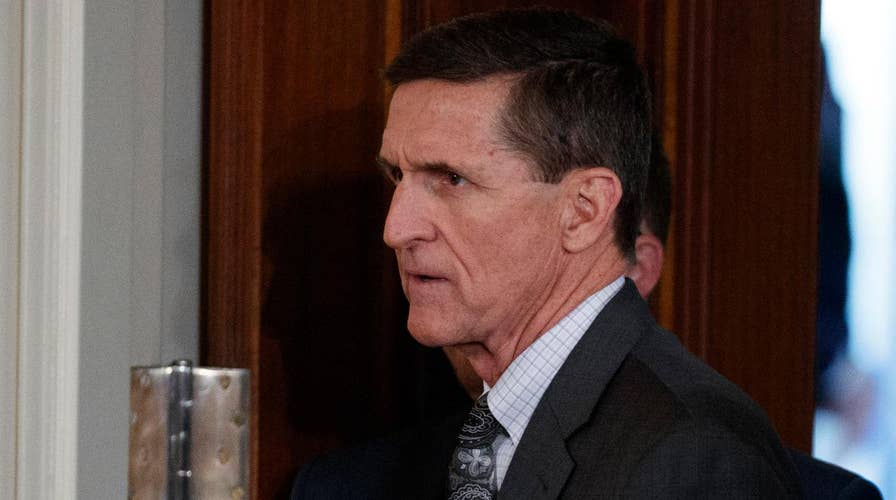President Donald Trump again took up the cause of former national security adviser Mike Flynn Saturday night, complaining that Flynn's "life is destroyed" while Hillary Clinton escaped legal reckoning.
Trump tweeted: "So General Flynn lies to the FBI and his life is destroyed, while Crooked Hillary Clinton, on that now famous FBI holiday "interrogation" with no swearing in and no recording, lies many times...and nothing happens to her? Rigged system, or just a double standard?"
He then added: "Many people in our Country are asking what the "Justice" Department is going to do about the fact that totally Crooked Hillary, AFTER receiving a subpoena from the United States Congress, deleted and "acid washed" 33,000 Emails? No justice!"
Clinton was interviewed for more than three hours at FBI headquarters over the July 4 weekend in 2016. Because she was not in custody, her interview was not recorded. Former FBI Director James Comey has said that Clinton did not lie to the FBI during her interview.
Earlier Saturday, Trump argued that there was nothing improper in Flynn's conversations with Russian Ambassador to the U.S. Sergey Kislyak in December 2016. Flynn pleaded guilty Friday to lying to the FBI about those conversations.
The president tweeted that he fired Flynn because the retired Army lieutenant general lied about those conversations to Vice President Mike Pence as well as the FBI. That suggested that Trump may have known Flynn lied to the FBI when he fired him.
Trump associates tried to put distance Saturday evening between the president himself and the tweet. One person familiar with the situation said the morning tweet was actually crafted by John Dowd, one of the president's personal attorneys. Dowd declined to comment when reached by The Associated Press on Saturday night.
It's unclear why Trump would cite lying to the FBI as a reason for firing Flynn. Doing so suggests the president knew at the time that Flynn had done something that is against the law, and therefore the investigation could not be as frivolous as he's been portraying.
It's also unclear how he would know that, if information about Russian contacts had not reached him, as he has been implying in his own defense.
Flynn left the White House in February, only acknowledging that he had given an incomplete account to Pence of his conversations with Kislyak. After Trump forced Flynn out, he asked FBI Director James Comey to end the bureau's probe in the matter, according to Comey's account. Comey refused, and Trump fired him, too.
Then-White House spokesman Sean Spicer said after Flynn's firing that it was the result of a "trust issue" and the White House counsel's office had determined there was not a legal issue.
"Whether or not he actually misled the vice president was the issue, and that was ultimately what led to the president asking for and accepting the resignation of Gen. Flynn," Spicer told reporters on Feb. 14. "That's it, pure and simple. It was a matter of trust."
Trump has been publicly dismissive of Comey and of special counsel Robert Mueller's continuing investigation, and was often generous in his appraisal of Flynn, except to say his adviser could not stay on the job after misleading his vice president.
At the time, Pence said Trump was justified in firing Flynn because Flynn had lied to him. Neither Trump nor Pence indicated concern then that the FBI had not been told the true story.
Pence, who served as head of Trump's transition, has not publicly commented on Flynn's plea.
The Associated Press contributed to this report.





